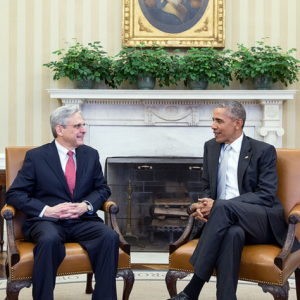On Wednesday, President Obama fulfilled his constitutional duty by nominating Judge Merrick Garland, an exceptionally well-qualified jurist, to the Supreme Court. Now, the Senate must fulfill its duty to hold a hearing on the nomination and give Judge Garland an up-or-down vote.
The Senate has never before strayed from this process. But immediately following the president’s announcement, obstructionist senators argue that the “people should have a say” in the nomination, and therefore the nomination should not move forward. These senators have forgotten that the Supreme Court is too critical to the rule of law for the Senate to put partisanship above governing.
Judge Garland — who has more federal judicial experience than any Supreme Court nominee in history — is a renowned jurist and chief judge of the D.C. Circuit Court of Appeals, to which he was confirmed with strong bipartisan support. He worked as a federal prosecutor and headed up the team that investigated the Oklahoma City bombing in 1995, leading the prosecution that ultimately brought Timothy McVeigh to justice. Justice Garland has earned his reputation as a brilliant, meticulous jurist with a knack for building consensus.
This approach has garnered him bipartisan respect throughout his career. Republican Sen. Orrin Hatch — one of the more vocal senators threatening obstruction — has described Judge Garland as a “fine man,” a “leading contender for the Supreme Court for years,” and “a consensus nominee.” Several Republicans who voted to confirm Judge Garland to the D.C. Circuit remain in the Senate.
There is simply no excuse for delay. And yet, many Republican senators continue to refuse to do their jobs. Some have said they will not even meet with Judge Garland. These are the same senators who have a pattern of obstruction on judicial nominees, and they’re the same ones who shut down the government three years ago. But now, their political gamesmanship is more irresponsible and has greater consequences for a co-equal branch of government than ever before.
The Constitution requires senators to participate in the appointment process. There is no exception anywhere in the Constitution that absolves senators of this duty during a presidential election year. Since 1875, the Senate has never refused to hold a hearing or a vote on a Supreme Court nominee. The last four Supreme Court justices were confirmed in an average of 75 days. There are more than 300 days left in the president’s term — more than enough for the Senate to hold a vote.
Refusing to do their job without expecting consequences is a privilege unique to senators. The average American who refused to comply with the basic tenants of his or her job would be fired. And for those working as senators, the stakes could not be higher. If obstructionist senators get their way, Justice Antonin Scalia’s former seat would sit vacant for more than a year, damaging the court’s ability to rule effectively for two terms. Meanwhile, millions of Americans are waiting for the highest court in the land to resolve important constitutional issues — from immigration to reproductive justice to voting rights.
Soon after the nomination of Judge Garland, Senate Majority Leader Mitch McConnell said that refusing to vote on the nominee until after the election would allow the voice of “the people” to be heard. But the American people do not agree with this obstruction. In fact, by a 2-to-1 margin, Americans want the Senate to hold an up-or-down vote on the nominee. And importantly, the American people re-elected President Obama in 2012, knowing that he would appoint federal judges for an additional four years.
As I stood in the Rose Garden on Wednesday morning listening to President Obama nominate Judge Garland, I was struck by the gravity of the moment. As I watched Judge Garland tear up, it hit home for me how seriously Judge Garland takes his lifelong commitment to public service. Given the political gamesmanship in D.C., it’s easy to forget how much the Supreme Court means — not just to the president or to Judge Garland, but to the heart of our democracy, to the students across the country learning about civics and civic responsibility, and to the American people.
President Obama respected the weight of that moment, and did his job by nominating Judge Garland. Now, senators must do their jobs. They must abide their constitutional duty, respect the institution of the Supreme Court, and give fair consideration of Judge Garland’s nomination on behalf of the millions of Americans waiting on justice from the Supreme Court.

